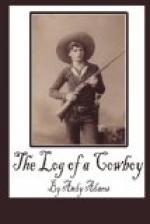Nothing daunted by this rebuff, my father argued the point at some length, when the ferryman relented so far as to inform him that ten miles higher up, the river was fordable. We arrived at the ford the next day. My father rode across and back, testing the stage of the water and the river’s bottom before driving the wagon in. Then taking one of the older boys behind him on the mule in order to lighten the wagon, he drove the oxen into the river. Near the middle the water was deep enough to reach the wagon box, but with shoutings and a free application of the gad, we hurried through in safety. One of the wheel oxen, a black steer which we called “Pop-eye,” could be ridden, and I straddled him in fording, laving my sunburned feet in the cool water. The cows were driven over next, the dogs swimming, and at last, bag and baggage, we were in Texas.
We reached the Colorado River early in the fall, where we stopped and picked cotton for several months, making quite a bit of money, and near Christmas reached our final destination on the San Antonio River, where we took up land and built a house. That was a happy home; the country was new and supplied our simple wants; we had milk and honey, and, though the fig tree was absent, along the river grew endless quantities of mustang grapes. At that time the San Antonio valley was principally a cattle country, and as the boys of our family grew old enough the fascination of a horse and saddle was too strong to be resisted. My two older brothers went first, but my father and mother made strenuous efforts to keep me at home, and did so until I was sixteen. I suppose it is natural for every country boy to be fascinated with some other occupation than the one to which he is bred. In my early teens, I always thought I should like either to drive six horses to a stage or clerk in a store, and if I could have attained either of those lofty heights, at that age, I would have asked no more. So my father, rather than see me follow in the footsteps of my older brothers, secured me a situation in a village store some twenty miles distant. The storekeeper was a fellow countryman of my father—from the same county in Ireland, in fact—and I was duly elated on getting away from home to the life of the village.
But my elation was short-lived. I was to receive no wages for the first six months. My father counseled the merchant to work me hard, and, if possible, cure me of the “foolish notion,” as he termed it. The storekeeper cured me. The first week I was with him he kept me in a back warehouse shelling corn. The second week started out no better. I was given a shovel and put on the street to work out the poll-tax, not only of the merchant but of two other clerks in the store. Here was two weeks’ work in sight, but the third morning I took breakfast at home. My mercantile career had ended, and forthwith I took to the range as a preacher’s son takes to vice. By the time I was twenty there was no better cow-hand in the entire country. I could, besides, speak Spanish and play the fiddle, and thought nothing of riding thirty miles to a dance. The vagabond temperament of the range I easily assimilated.




